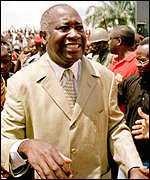Could this be the fate of TnT
Monday, 30 October, 2000
Abstract from BBC News
Police opened fire on opposition activists on Tanzania's troubled island of Zanzibar on Monday, after opposition leaders demanded the annulment of Sunday's general elections.
Elections on the Tanzanian mainland meanwhile went smoothly.
Reports from Zanzibar say dozens of police in full riot gear fired tear gas, rubber bullets and live ammunition at protesters after they threw stones at a police car in the island's main town.
"There is no president and there is no government. We are calling for an interim government acceptable to both parties," said Shariff Hamad.
The violence broke out after election officials annulled the vote in 16 of the island's 50 constituencies due to irregularities.
Commonwealth observers have dismissed the Zanzibar polls as a "shambles", with the opposition Civic United Front (CUF) demanding that the results be annulled.
Sunday's polls were only the second multi-party elections in Tanzania since it gained independence in 1961.
Military backs Ivory Coast challenger
October 25, 2000
Abstract from BBC News
The head of Ivory Coast's army has declared allegiance to Laurent Gbagbo - the former opposition leader who declared himself president amid Wednesday's popular uprising.
Laurent Gbagbo
Mr Gbagbo has been holding a string of meetings with top army and police officers, in an attempt to consolidate his hold on power.
The whereabouts of former military ruler General Robert Guei remain uncertain, though most reports suggest he has fled to Benin.
Sunday's controversial election - in which Mr Gbagbo and General Guei were regarded as the only serious contenders - was followed by three days of uncertainty and violence, during which both candidates declared themselves the victor, and General Guei sent soldiers to halt the counting of votes.
Thousands of Mr Gbagbo's supporters took to the streets of Abidjan, eventually storming the state broadcast headquarters, braving gunfire by troops loyal to the general.
Speaking on state radio on Wednesday, Mr Gbagbo declared himself the "first president of the second republic of Ivory Coast".
But he said later that he would not take up the post of head of state until the national electoral commission validated his victory and announced the results of Sunday's presidential poll.
The uprising was sparked by the controversial presidential election on Sunday, which Mr Gbagbo appeared to be winning until soldiers halted the count.
On Tuesday, General Guei dissolved the country's electoral commission and was formally declared the winner by the Interior Ministry.
Eyewitnesses report having seen members of General Guei's family in Benin on Wednesday, though there are no confirmed reports that the general himself has arrived.
There have been calls for a fresh election, since two major political figures had been barred from Sunday's vote.
Lessons for TnT
The 'people power' that first swept Phillipine President Ferdinand Marcos from power has taken on new significance with the recent departure of political leaders in Yugoslavia and last week, in the Ivory Coast.
So much so, that tyrants, wherever they exist around the world, are being put on notice that their grip on power can and will be unhinged if and when people believe they have had enough.
While this 'people power' on its own does not solve national problems, it is a clear sign that people are unwilling to just sit by and allow corrupt politicians a free reign.
The Ivory Coast was for decades an African anomaly: a country where people of different religions and ethnic groups co-existed peacefully, under policies enacted by President Félix Houphouët-Boigny, who led the country for three decades.
But President Bédié, who took over in the early 1990's, stirred up xenophobia aimed at Muslim northerners in an attempt to sideline his main rival, Mr. Ouattara, who was deputy managing director of the International Monetary Fund until last year.
As Mr. Bédié spoke of "pure Ivoirians" and "foreigners," northerners and immigrants became targets of the authorities. Among ordinary Ivoirians, the cleavages widened between Muslims and Christians.
General Gueï, who seized power last year, adopted a similar anti-northern position. What is more, Mr. Gbagbo, who had been allied with Mr. Ouattara, broke off their union and also inserted ethnocentric language in his political messages.
Gbagbo addresses Ivorian nation
Ivory Coast's uncertain future
A sample of corruption cases from around the world
